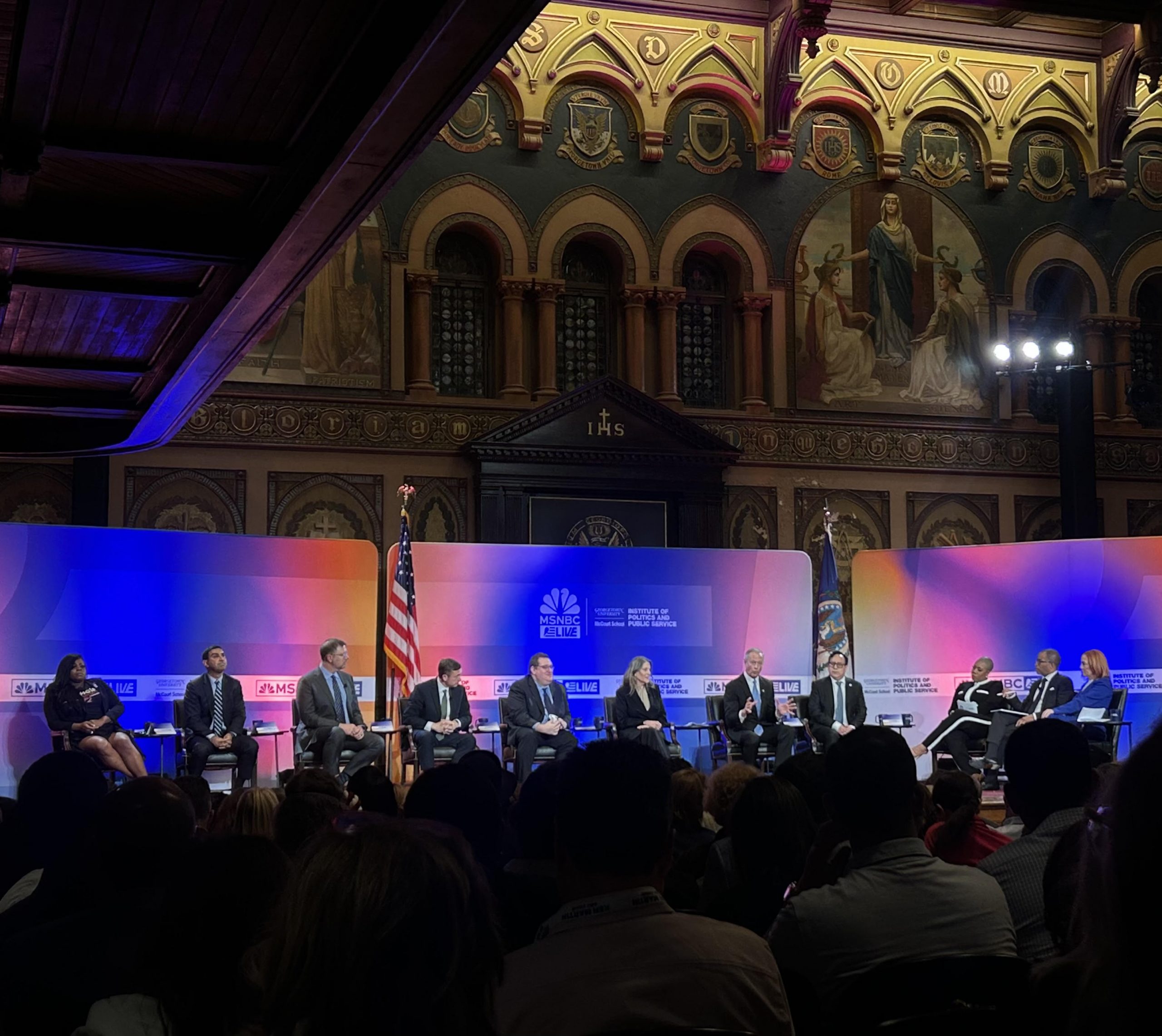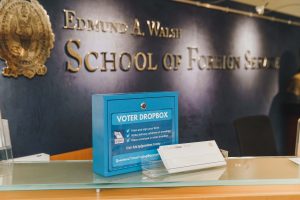Just two days before the election for chair of the Democratic National Committee (DNC), the candidates vying for DNC leadership positions gathered in Gaston Hall for the fourth and final officer candidate forum. At the Jan. 30 event, hopeful party leaders expressed their visions for the future while protesters expressed their frustrations with the status quo. Ultimately, Ken Martin, Minnesota’s Democratic Party chair, won the election for chair of the DNC on Feb. 1.
The day-long event on Jan. 30 included forums for a number of positions within the DNC, with candidates seeking to fill outgoing Chairman Jaime Harrison’s position taking part in the final forum of the day. Mo Elleithee, the executive director of GU Politics, joined MSNBC’s Luke Russert, Jen Psaki, Symone Sanders-Townsend, and Jonathan Capehart to moderate the event. Psaki, Sanders-Townsend, and Capehart are all former GU Politics fellows.
The eight candidates who ran for DNC chair and spoke at the forum were:
- Dr. Quintessa Hathaway, educator and former Democratic nominee for the House of Representatives (AR-02)
- Ken Martin, chair of Minnesota’s Democratic Party
- Martin O’Malley, former governor of Maryland
- Jason Paul, attorney and political strategist
- Faiz Shakir, campaign manager for Bernie Sanders’ 2020 presidential bid
- Nate Snyder, former Chief of Staff for the Office of Partnership & Engagement at the Department of Homeland Security (later endorsed Martin)
- Ben Wikler, chair of Wisconsin’s Democratic Party
- Marianne Williamson, author and 2020 and 2024 presidential candidate (later endorsed Martin)
Following dramatic losses for the Democratic Party in 2024, candidates discussed critical challenges facing the party such as messaging, outreach, and finding a clear party platform.
Still, applause and “Thank you, Jaime” chants filled the crowd as Harrison—the outgoing chair—entered the stage.
“I’ll be a better former chair than I was chair,” Harrison said, in a nod to the late President Jimmy Carter, whose humanitarian work and public service post-presidency some consider more impactful than his time in office.
Among the candidates running to replace Harrison, the looming theme was a need for change.
Following opening statements, just short of a dozen protestors cut off Sanders-Townsend as she attempted to ask the first round of questions. The protestors were with Sunrise Movement, a youth-run political action group focusing on the climate change crisis. Their chants demanded a party stance for the working class over billionaires and action on climate change.
“What will you do to get fossil fuel money out of Democratic politics?” one protester yelled.
After a series of sporadic interruptions, one member of the audience replied, “Protest the Republicans! Protest the people who are actually hurting you!”
Candidate Dr. Quintessa Hathaway, an educator and former congressional candidate from Arkansas, acknowledged the protesters.
“The youth are begging for their voice to be heard,” Hathway said. “No longer can any voice be silenced.”
Attorney Jason Paul and author Marianne Williamson pointed out that they were the only two candidates to sign Sunrise’s pledge, which calls for a ban on corporate and political action committee (PAC) donations to the DNC, as well as a ban on super PAC spending in primaries.
“I think it’s a little odd when people onstage agree with you, that you then yell at them,” Paul said in reference to the protesters.
After Georgetown University Police Department officers removed the protesters from Gaston Hall, the conversation continued on the topic of corporate campaign financing.
Psaki asked if any candidate would take money from an oil or gas company—all replied no.
Martin O’Malley noted that he was one of few candidates to make their donors’ information records public. So far, Ken Martin and O’Malley have disclosed their donors’ names, but Ben Wikler has not fulfilled his pledge to do so.
Williamson said that improving the Democratic Party’s messaging will allow the party to rely more on grassroots funding and less on billionaire donors.
“When we become the people’s party again, when we align our own ethics with what we say we believe in, we won’t even have to be begging from billionaires,” Williamson said.
Faiz Shakir, Bernie Sanders’ former campaign chief, agreed.
“I do not believe that we would suffer from a lack of money if we had an ambition of being a grassroots-funded, 100% people-powered organization,” Shakir said.
Party messaging was a common theme throughout the forum. Nate Snyder linked President Trump’s recent actions with the Great Replacement Theory, a conservative theory that political elites are seeking to increase the number of racial and religious minorities in efforts to displace the Christian and white population in the U.S.
“The president is forwarding something that’s based on the white supremacist narrative called the Great Replacement Theory,” Snyder said. “We don’t as Democrats have a master narrative yet where we could push back.”
With the mood of the earlier protests lingering throughout the evening, various candidates spoke to the Voice after the event about the importance of young people and activism for the Democratic Party.
“How are you going to make the young people no longer feel abandoned and neglected? No longer abandon and neglect them,” Williamson told the Voice. “Just tell the truth, be ethical, be real.”
David Hogg, who made history as the youngest person ever elected to DNC leadership following his successful bid for vice chair, also said that young people play an essential role in the authenticity that voters today are yearning for. When asked for his advice to young people eager to get involved in political leadership, Hogg said, “Run for office.”
Many candidates emphasized that protests are coming from a place of care and passion for important issues.
“I’m surprised I haven’t seen more [protests],” O’Malley said. “I admire the passion. They’re going to be on this planet a lot longer than I am. And if they stop caring passionately about the planet, then we have no hope at all.”






